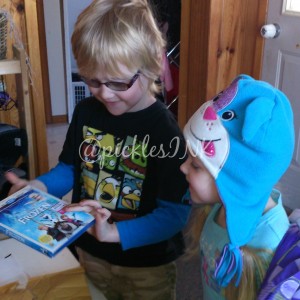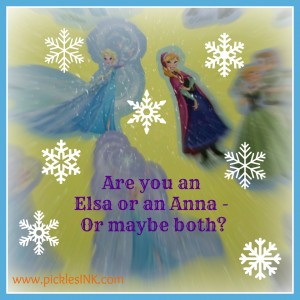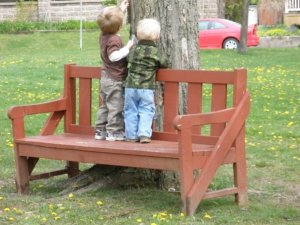We received our pre-ordered* copy of Frozen yesterday, and now that my kids have now watched it about 87 times, I fancy myself somewhat of an expert on the movie. Based on personal experience, I also fancy myself somewhat of an expert on depression. This post is whence the twain shall meet.

Ben and Molly are overjoyed to receive their Frozen DVD
Since Frozen was released in theatres, it has been receiving quite the buzz – I’ve heard about it being an amazingly feminist movie – Disney finally redeeming itself for decades of Princess culture. I’ve heard that it’s allegory for gay pride and/or propaganda for ‘the homosexual agenda.’ I’ve heard from people who refuse to watch it until they stop hearing that goddamn song 8 times a day. I’ve heard from people who love that goddamn song so much that they sing along to it 8 times a day (*cough* me *cough*). And I’ve heard that it’s a piece of irritating garbage with half-rate singers, cheesy melodies, and the worst Princess-related story-line Disney has ever written.
My take on the movie itself? I’m a fan. I enjoyed the music and Disney’s deliberate send-up of its own patriarchal history of damsels in distress, handsome princes on white steeds, and true love at first sight. There was a cute blink-and-you-missed-it nod to diversity with a presumed 2-dad family and a neat twist on the usual moustache-twirling villain. Like so many children’s books and movies though, even with those giant leaps forward it still barely squeaked past the Bechdel test and there wasn’t a person of colour to be found (but no ethnic caricatures, so baby steps, right?).
Now we get to the part of the post about depression – the part that I start hyperventilating every time I think about writing. In so many ways…more and more each time I think about it…Frozen provides a perfect metaphor for depression. Beyond that, Frozen manages to provide dual perspectives – showing us a view of depression from both inside and out.**
We don’t all get literally shut away in our rooms and directed to not let anyone see how we feel, but the messages are all around us, every day:
Snap out of it. ••• Boys don’t cry. ••• Put on your big girl panties. ••• Man up. •••This too shall pass. ••• It could always be worse, right? ••• Behind the clouds, the sun is shining. ••• Every cloud has a silver lining. ••• Tomorrow is another day. ••• What doesn’t kill you makes you stronger. ••• Take it like a man. ••• Don’t air your dirty laundry in public. ••• It’s all in your head. ••• Life’s not fair. ••• Time heals all wounds. ••• Into every life a little rain must fall. ••• Pull yourself together. ••• Try and think about something else. ••• Fake it till you make it. ••• Smile and the world smiles with you, cry and you cry alone.
Like Elsa, many of us with depression are expected to have our ‘moments’ in private, hiding away and telling ourselves over and over, “Don’t let it out. Don’t feel. Don’t let them see,” until we have mastered the knack of acting like regular people, at least when it matters. And when you’re depressed you want to do that anyway – it’s exhausting out there! Like Elsa shut up in her room, I had a mantra in high school – I sang Simon and Garfunkel in my head, over and over – “I am a rock. I am an island. And a rock feels no pain. And an island never cries.” I still get knots in my stomach when I hear that song or even think those words. “Don’t let it out. Don’t feel. Don’t let them see. Don’t feel. Don’t feel. Don’t feel.” Out and about, of course, you do your best to fake it – act normal, keep up with your schoolwork, get good marks; “Don’t let them in. Don’t let them see. Be the good girl you always have to be.”
When depressed, many people, myself included, engage in self-destructive behaviour, either because it gives you an outlet – a real reason, a tangible excuse for all those feels in your head that shouldn’t be there because there’s nothing really wrong, or because it can blunt those feelings, if only temporarily. Many people are also carers – If you spend all of your energy looking after the people around you, you just don’t have time or energy to think about yourself. Bonus points if they are dealing with real actual problems that are worse than your imagined ones so you can tell yourself you’re upset because you’re worried about them!
And like Elsa, for many people there comes a point when it’s just too hard to keep up that façade. Something brushes past your desperately clinging fingers, and all those emotions finally burst out. And often that’s followed by a sense of relief and calm – when you hit rock bottom, you finally have the freedom to be yourself. You don’t have to answer to anyone. You don’t have to pretend anymore. And it doesn’t matter what people think – You are perfectly okay the way you are, and they should just leave you alone and let you be. You’re not hurting anyone, right? It doesn’t concern them. You can build your ice castle up around you, shut the world out and be yourself by yourself.
But as we saw with Elsa, depression doesn’t just stop at being sad. Depression is a selfish illness – and before you react to that statement, please hear me out, because I’ve got the damn thing, so I’m pretty comfy owning that statement. When I’m depressed, I’m pretty effing selfish. When you’re depressed you’re irritable, rage-filled, irrational, unable to enjoy ordinary enjoyable things; you can’t sleep; you sleep too much; you’re lazy and unmotivated – and those traits don’t just impact you. They impact everyone around you. Recall Ben’s, “other kids’ parents play with them, but you don’t.” When you’re depressed, you don’t have the motivation to play with your kids, to tidy your house, or to keep your temper at the best of times, let alone when your kids or spouse are getting to you.
JD Bailey, Honest Mom, has written about the scariest part of depression – the rage. This is a fury that bursts out of you, uncontrollable and terrifying in its intensity. You feel it building inside of you – heart pounding, jaw clenching, until it gets to a point where it’s unstoppable and suddenly you’re lashing out, verbally, physically, mentally. Not everyone experiences the rage, but if you do it’s terrifying – for you and for the people around you. This can be the point for a lot of people when you realize that you need help. Up until now, you have held it all in and let yourself believe that it’s not affecting the people around you – but the first time you create that giant snow monster and set it loose on people, screaming, “DON’T COME BACK,” (or “JUST EAT YOUR DINNER,” or “WHY WON’T YOU JUST SLEEP?” the impact on those you love becomes undeniable.
There was a meme sweeping Facebook last week starring Eeyore:
It urges us to accept people with depression as they are, warts, unhappiness, and all – and I agree, up to a point. It is important to let yourself, and your loved ones, feel. If you need to grieve, grieve. If someone is hurting, don’t tell them “It could be worse,” or “Pull yourself together.” People need space to be upset, to be sad, to be angry – but there is an extremely fine line between supporting and enabling. Poor Eeyore – his friends patted him on the back, helped him find his tail, and rebuilt his house of sticks when it got blown away, and I’m sure he really appreciated it. But he was still sad. And at some point, probably one by one, they said, “Oh, screw it, I guess that’s just Eeyore,” and they still let him tag along, because they didn’t want to be mean, and they let him just be his depressed self. And Eeyore was still sad.
And it might not have helped, but then again it might have, if one of them had said, “Hey Eeyore? I know it’s not really any of my business, and I’m not judging you, but we’ve found your tail and fixed your house and it just seems like you’re hurting a lot and you’re never really happy. I care about you and I really want to help you get the help you need.” And maybe Eeyore would have said piss off, which is fair, and hopefully that friend would have said, “Okay, buddy. I’m here though whenever you’re ready.” But maybe Eeyore would have had a good cry on that friend’s shoulder because finally someone got that he was sad, and he didn’t even know why, and he did want to figure out how to stop it, and then maybe he and that friend might have started Googling some options.
Frozen had a happy ending. The much more difficult ending would have been the one where Anna, out of self-preservation, has to let go herself – letting go of guilt and walking away, understanding that whatever that other person decides to do, it is not up to you to change them. There can come a point, in loving someone who is depressed, when you have to love yourself more. I’ve done it. It wasn’t easy and it wasn’t pretty, but it was hands down the best decision I ever made.
Elsa needed Anna, because by herself, she didn’t know that she wasn’t okay, and Anna stepped up and, against all odds, reached out, again and again. People with depression need Annas. It’s hard to do it on your own – first because you don’t always realize that you need help and after that because even when you realize it, that help is not easy to get. Even when Elsa pushed her away, and even when Elsa hurt her, she kept reaching out, until finally Anna was able to break through Elsa’s self-involvement, to show her that isolating herself wasn’t protecting anyone, and that even though her actions were affecting her loved ones, they loved her and wanted her, warts and all – but only the warts she wanted to keep.
Elsa kept her powers – the magic that was integral to her personality – but got the help she needed to be able to control it, not be controlled by it. Her power no longer called the shots. People with depression can be pretty awesome. We often have wicked cool senses of humour – Elsa created Olaf, didn’t she? Scratch the surface of many very funny and talented people (The Bloggess***, and pretty well every other humour blogger in the world) and comedic actors, for example – and you’ll often find depression. We tend to be realists and are pretty comfortable with our own warts…and maybe a little too comfortable pointing out other peoples’.
If, like Elsa and Anna, we find that happy ending, we don’t become different people – we’re generally the same dry, sarcastic, realistic people as before, just a little easier to live with, and finding it a little easier to live with ourselves.
~ karyn
*Pre-ordering? Not actually a thing. You order. You don’t pre-order. Ordering is when you say, “Can I have this when it’s ready?” Pre-ordering would be saying, “Can I have this when it’s ready to be ready?” or something. Like pre-registering – what the heck is that? What do you do when you pre-register? You say, “Sign me up for that thing I want to do! Here’s all my information!” You know what I call that? REGISTERING. Yeesh.
**For another take on Frozen and depression, walk the plank over to Domestic Pirate for a powerful post on how Elsa and Anna represent the two warring voices of depression in her head.
***Seriously – if you haven’t read Let’s Pretend This Never Happened yet, you need to. You will ugly cry and laugh hysterically at the same time. So…uh…like my friend David recommends, try to avoid reading it in public.






